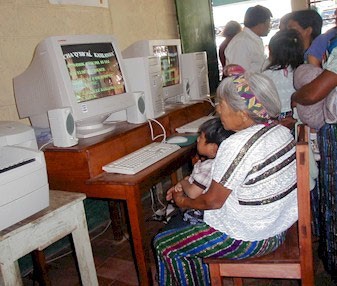
Some assume that rural indigenous populations are not ready for information technology, that they are not interested in it, and that, in any case, there is not enough basic infrastructure to extend technology from urban to rural areas.
Enlace Quiché, a technology program supported by USAID in the heart of the Quiché region in the Guatemalan highlands, has proven them wrong on every count.
Enlace Quiché — which means "link" in Spanish — trained bilingual (Spanish-Mayan) educators to teach Mayan students and their families how to use and benefit from technology, especially computers, the Internet and video. The training has improved the quality of education for children of the rural poor. It has also made it possible for rural Mayans to cross the digital divide and strengthen their cultural and linguistic identity.
Operated by USAID from 2000 to 2004, Enlace Quiché was so successful that when USAID's involvement ended it became an independent Guatemalan organization called Ajb'atz' Enlace Quiché. The organization continues with the efforts it developed with USAID, including a virtual community through its Web site (www.enlacequiche.org.gt), a training center, 28 bilingual intercultural technology centers, and 14 interactive compact discs on Mayan education, culture and language.
Five years ago, no one dreamed that integrating information technology into rural schools was feasible. But through USAID's and Enlace Quiché's collective efforts, a rapidly growing number of Mayans — from children to grandparents — are harnessing computers and Internet as tools for development, for education and for strengthening their identity.







Comment
Make a general inquiry or suggest an improvement.